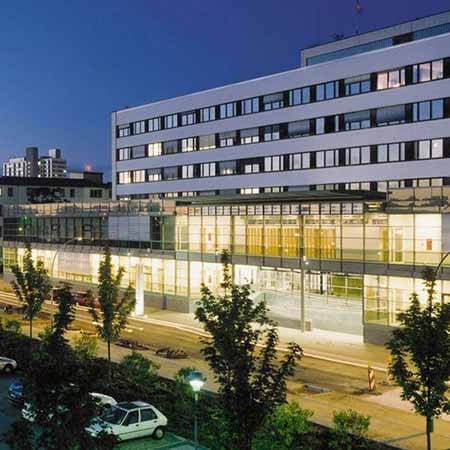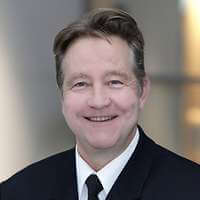Epileptology
Here you will find most technologically advanced epileptological hospitals in the world
Focus of treatment:

Department of Adult and Pediatric Neurology, Epileptology
The Department of Adult and Pediatric Neurology, Epileptology offers the full range of services for the diagnostics and treatment of diseases of the nervous system. The department's team of doctors has rich experience and exceptional professional skills in the treatment of epilepsy, strokes, Parkinson's disease, chronic



Department of Neurology and Epileptology
The Department of Neurology and Epileptology offers the full range of services in these medical fields. It specializes in the diagnostics and treatment of acute and chronic diseases of the central and peripheral nervous system, ranging from inflammatory diseases of the central nervous system, movement disorders and ending with n



Department of Adult and Pediatric Epileptology
The Department of Adult and Pediatric Epileptology offers the full range of modern diagnostics and treatment of all forms of epilepsy. The department annually admits more than 5,000 patients and ranks among the largest specialized medical facilities of this kind in Germany. It provides comprehensive medical care programs, includ




Epilepsy is one of the most common diseases within neurology, which is manifested by the predisposition of the body to the occurrence of seizures.
Content
- Epileptology overview
- What causes epilepsy?
- What does the epileptic seizure look like?
- Treatment of epilepsy
- Cost of treatment in European hospitals
- How to start your treatment abroad?
Epileptology overview
Epileptology is a branch of neurology that studies epilepsy and its treatment methods, while an epileptologist is a neurologist who underwent additional advanced training in epilepsy.
The scientific separation of epileptology as a branch within neurology is not accidental, since the diagnosis of epilepsy, treatment, and management of patients with epilepsy requires a neurologist to deeply study the neurological disorders, the use of antiepileptic drugs, and methods of neuroimaging.
Within the framework of epileptology, pediatric epileptology is also distinguished. Pediatric epileptology is a subsection of neurology dedicated to epilepsy at a young age. Due to the peculiarities of the state of the child's body and its constant development, the therapy for children with epilepsy may differ significantly from the treatment of adult patients with epilepsy.
It is worth noting that the disease quite often affects children: scientific research shows that it occurs in 7 children out of 1,000 under the age of 16 years. In addition, in childhood, the disease runs with certain features. It is for this reason pediatric epileptology was isolated.
The fact is that in young children, seizures may occur with a fever during infectious diseases, intoxication, and some reactions to pharmacological substances. Seizures may be accompanied by such metabolic disorders as diabetes mellitus. However, the neurologist can only confirm the diagnosis if there have been at least two seizures, and no other causes other than epilepsy could lead to them.
What causes epilepsy?
As diverse as the clinical manifestations of epilepsy are, its causes are just as numerous. Epileptic seizures can be caused by brain injury and previous brain infection. In addition to these causes, epilepsy can be caused by tumors or stroke. If seizures occur after body exposure to a particular factor, doctors call such epilepsy symptomatic. The list of causes of epilepsy is not limited to those listed, but there are such seizures, for which you cannot find a specific cause.
The disease may occur by itself, but genetic predisposition plays a major role in its development as well. This type of epilepsy is called idiopathic epilepsy. Another form of epilepsy neurologists distinguish is reflex epilepsy. With it, the seizure is provoked by an external stimulus. One important principle epileptologists adhere to in treating such seizures is to avoid seizure triggering factors.
The basis for the development of seizures in epilepsy is the imbalance of two brain systems: excitatory and inhibitory. Normally, these systems work simultaneously, creating an optimal level of neuronal activity. Epilepsy causes an increase in excitatory activity with a lack of inhibitory activity. As a result, this leads to the fact that entire groups of nerve cells begin to synchronously produce high-power electrical impulses, which can spread to other parts of the nervous system, resulting in a seizure. Antiepileptic drugs can markedly reduce neuronal overactivity or suppress it completely. The seizure itself is only the tip of the iceberg, a noticeable but not exhaustive part of the disease. With a seizure, the brain "releases" excess tension, so then a seizure becomes a chronic way to reduce pathological nerve cell activity.
As has already been said, some cases of epilepsy are due to genetic abnormalities that affect nerve cell function. A neuron's electrical signal is produced by the alternating opening and closing of ion channels on the cell surface, and mutations affect the genes responsible for these channels. The condition can be transmitted with the genes from generation to generation, so some patients suffer from the inherited forms of epilepsy. Very often, the presence of epilepsy in a family member raises questions about whether the disease will be passed on to their offspring. If one parent has epilepsy, then the risk of a child developing the disease is 3 times higher than the average.
What does the epileptic seizure look like?
The manifestations of epilepsy are very diverse. This is directly related to the fact that occurrence of seizures can be triggered by various factors. A seizure may occur just once, but in other cases, it will recur with a certain frequency. The nature of seizures can change with the course of the disease: their duration and appearance do not remain stable throughout life in some patients. Despite these issues, epileptologists have identified scientific features of seizures.
First, epileptic seizures always have a sudden onset. A patient with epilepsy cannot accurately predict when they will have a seizure. This feature of epilepsy can be considered one of the issues that affect the psychological state of the person. A patient with epilepsy lives in tension, constantly waiting for the moment a seizure will start. At the same time, some patients before the onset of seizures may have an aura – a specific sensation that a seizure is coming. The aura may present in the form of smells, emotional experiences, or have a different appearance.
Secondly, an epileptic seizure has a short duration: from fractions of a second to several minutes. Depending on the type of epilepsy, the person may freeze and not notice the attack, experience some unusual sensations, or fall and faint. In some cases, seizures may follow one after another, but a normal single seizure does not last long.
Third, a seizure in epilepsy can stop on its own. The development of a seizure does not necessarily require antiepileptic medication to interrupt it. Special pharmacological interventions are used only when there is a continuous series of seizures (epileptic status) or when the cause of the seizure is a factor operating at the time of the seizure. Such situations include seizures in children with fever.
Fourth, seizures in epilepsy have a stereotypical nature. If a patient has a seizure of one type, then later it will recur in the same form. The appearance of seizures may sometimes change with the course of the disease, but often seizures will look very similar and pass on similarly to one another.
In terms of the scientific picture of a seizure, the pathology action search begins with an area of the brain where the excessive electrical activity of the neurons occurs. Also, the course of the attack depends on whether the excessive excitation is transferred to other parts of the brain. For example, if the focus of pathological excitation is in the temporal lobe, an attack may take the form of olfactory, gustatory, or auditory sensations. When the frontal lobe is affected, seizures may manifest as speech issues, the rapid turning of the head and eyes, and other movements that the patient cannot control. Other manifestations of seizure activity in epilepsy may be:
- Feeling that the situation a person is in has happened before, that they have experienced it before (a feeling of deja vu).
- An unexpected flow of thoughts and memories that capture the person's attention.
- Issues with perception of one's feelings and emotions or a sensation that the world around them is unreal (depersonalization).
- Issues with feeling of the integrity of the body, its proportionality, and correctness of its structure.
Given the complexity and variety of clinical manifestations of epilepsy, it is up to the epileptologist and neurologist, rather than physicians, to establish a diagnosis of the pathology.
And later on, the seizure is usually followed by the issues with returning to the physical and mental condition prior to it, and quite often, depression and subsequent issues with socialization occur.
Treatment of epilepsy
The treatment of a seizure or epilepsy depends on the features of the diagnosis and the underlying cause of the illness, if it is possible to find any.
Antiepileptic medications are the first-line therapy for epilepsy. Smaller, but sometimes significant effects are shown by behavioral therapy to help eliminate seizure triggers, nutritional therapy, and vagus nerve stimulation. In severe cases of epilepsy or when a higher drug dosage does not give the desired pharmacological effect, surgical methods are used.
At the initial consultation with an epileptologist or neurologist, patients with a first-time seizure are prescribed appropriate diagnostic tests (these mostly include EEG, video-EEG monitoring, and MRI). In many cases, the patients are also recommended to have a consultation with other specialists. With the first-time seizure, the task of the epileptologist is to make a correct diagnosis and choose adequate starting tactics of treatment.
The choice of therapy is determined not only by the fact of confirmation of the scientific genesis of seizures, but also by determining the specific form of the disease: whether it is a manifestation of a hereditary or acquired pathology, whether the seizures are generalized, or local, etc.
If a correct diagnosis is made and the type of epilepsy is established, in most cases, it is possible to control the course of the disease, reduce the frequency or completely get rid of seizures. In some cases, it is necessary to modify treatment, change the basic drug, or supplement it with adjuvant drugs. An important component of managing a patient with epilepsy is the possibility of pharmacological monitoring, that is, measuring the concentration of the drug in the blood of the patient. This allows clarifying the individual dosage of prescribed medication.
Unfortunately, scientific research shows that about 25% of patients cannot control the disease with drug therapy. In such cases, the patient comes in for additional, in-depth diagnostic examination. It often turns out that the failure of drug therapy is due to diagnosis issues. After the examination, therapy may be modified. In cases of resistance to medication, if there is no prospect of further drug therapy, the patient may be offered surgical treatment. A surgical approach is possible in cases where the area in the brain that produces seizures is accurately identified.
The prognosis depends largely on the cause of epilepsy and the form of the disease. Up to 70% of patients demonstrate a satisfactory response to antiepileptic drugs. A prognostic sign of favorable long-term seizure control is a satisfactory therapeutic response over several months. In the long term (absence of seizures for 2 – 5 years), about 50% of patients achieve treatment success and stop taking antiepileptic drugs.
Cost of treatment in European hospitals
Modern methods of epilepsy treatment in neurology centers abroad have shown high efficiency, and that is why more and more patients undergo treatment in European hospitals. The price of epilepsy treatment depends on the selected therapy methods and is calculated individually for each patient.
The cost of treatment with conservative therapy (and diagnostics) starts at 8,151 EUR.
The cost of treatment with deep brain stimulation starts at 27,653 EUR.
The cost of treatment with surgery starts at 28,886 EUR.
You can find out the price of treatment in European hospitals for your case by filling in the request form on the Booking Health website.
How to start your treatment abroad?
You can start epilepsy treatment with Booking Health, and this will be much more convenient, much less stressful, and more financially secure than doing it on your own.
With Booking Health, you can choose a hospital abroad that meets your needs, get a consultation with a medical specialist, get a program of treatment and diagnostics abroad, as well as find out its cost.
If you have any questions, you can contact Booking Health at any time by leaving the request on the website.
Authors: Dr. Nadezhda Ivanisova, Dr. Sergey Pashchenko

